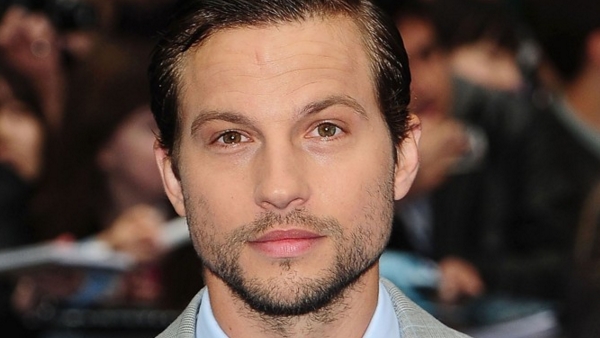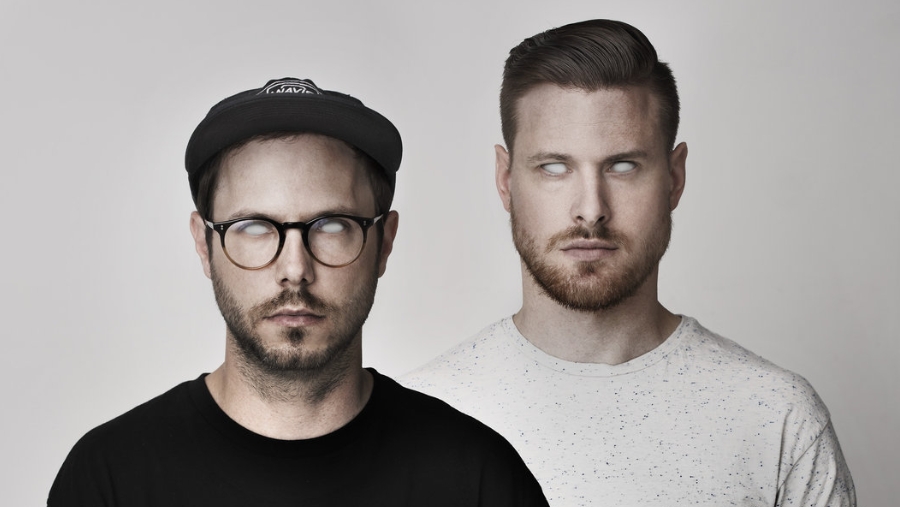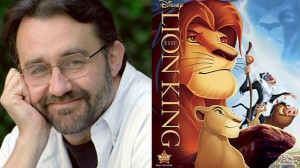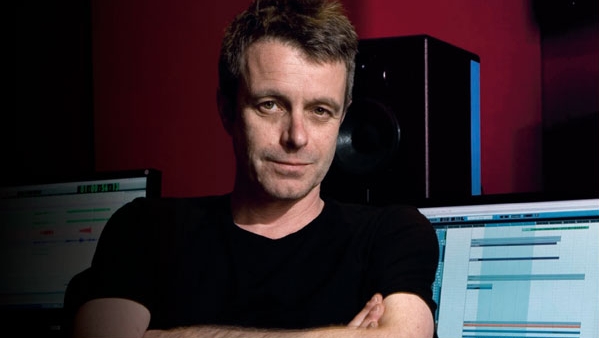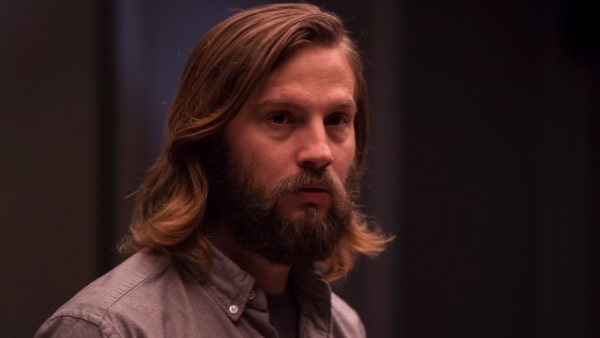 The term slow-burn doesn’t really apply to Karyn Kusama‘s paranoia thriller, The Invitation. This Drafthouse title is more appropriately like being slow-roasted alive. The film is effective in that it’s never truly transparent in what it’s trying to do. You may think you have it figured out from the get go, but when the story gets crazy, which is an understatement, things take a turn like you wouldn’t believe.
The term slow-burn doesn’t really apply to Karyn Kusama‘s paranoia thriller, The Invitation. This Drafthouse title is more appropriately like being slow-roasted alive. The film is effective in that it’s never truly transparent in what it’s trying to do. You may think you have it figured out from the get go, but when the story gets crazy, which is an understatement, things take a turn like you wouldn’t believe.
As an actor in the film, Logan Marshall-Green (Devil, Prometheus) was almost like the voice of the audience, a sort of surrogate for our experience – what would we do if we saw someone locking the door at a friend’s dinner party, or how would we react to find bars on all the windows? As we talked, we learned that Marshall-Green’s main goal was to make Will “real”. The Invitation is a thriller that starts off uneasily with the right amount of wrong elements thrown in every step of the way. Yet like a house of cards – or better, wine glasses – you know it won’t be long until it all comes tumbling down.
The real question, aside from whether anything you are seeing is real or in Will’s head, is when this will go south. We had an awesome, insightful, and highly spoilerific time talking to Logan. However, we want to tell you right up front that reading any of what follows will ruin the story…unless you’ve already accepted The Invitation.
– – – [ SPOILERS BELOW ] – – –
GoSeeTalk: Logan, The Invitation was intense. I loved it, but before I get to that I wanted to tell you I’m a big fan of Devil. I think both your performance and the film are rather underrated. Just wanted to throw that out there.
Logan Marshall-Green: Wow, thanks a lot man. You threw it, and I caught it! [laughs] Many thanks.
I read that once you were cast in the role, everyone else just fell into place. So when someone says “I want to do a killer cult dinner party“, what’s your first reaction?
[laughs] Not that that was my experience, but my first response to anything really is to say, “Let me read the script. What kind of ‘killer cult dinner party’ are we talking about?” [laughs] “Who do you want me to play? Who is this human being?”. So while that wasn’t exactly how I was approached to play this role, certainly – as I was reading the script and later finished it – it didn’t dissuade me from wanting to know more.
After saying yes to Karyn, what did you bring to the role of Will that maybe wasn’t on paper? Will went through a real emotional loss. There was turmoil in your marriage as the result of your son dying, and your hair grew long, and you became a different person. What was different on the page from what we saw on the screen?
Physically, there wasn’t much of a description other than age. Karyn and I both decided that I would keep on growing my beard. It wasn’t very long then, but we had about 3 months before we started shooting, so you’re seeing about 3 months of growth there. What I didn’t read on the page, even though there was potential there and the script was amazing, was the emotional connection and finding a vulnerable path to guide him through how unreliable he seems to be, so that it isn’t just an emotional breakdown, but a real holistic breakdown.
That was very important for me and was my one question that I needed to be answered by Karyn Kusama, Phil Hay and Matt Manfredi. “How vulnerable are you going to allow me to be in this role?”. To me it was of the utmost importance that we take the hero out of Will and we don’t make him right all the time, and we set up these guideposts that I can maneuver around. They were of course game and it was probably their intention to begin with, but I couldn’t have known that until I talked with them to see if they wanted to make the same movie, and they did indeed. I needed Will to be a real human being, and not an archetype in a genre film.
A lot of this felt like stage acting, almost like it was happening real time in a matter-of-fact style. It was also very claustrophobic while you, many times, interacted with numerous characters. How do you approach acting when it’s opposite one person in a room versus when you are the center of attention in a crowded setting? What are your angles? What are you trying to go for?
I think it was about remembering that this is an ensemble piece, it has to be. It has to feel like a group going through something together. Now everyone has their own experience, but it was important for Will. Granted, we’re on Will’s roller coaster ride but it doesn’t make his experience that night any greater or lesser than any other character. So I think Karyn did a really great job of getting into the back story and communicating the intentions and three-dimensionality of all of the characters just as much as we did Will. It was about knowing everyone or about why you don’t know someone.
So we were really just bouncing off of each other as actors and certainly we were put into a kind of sardine can for about a month, but it helped to quicken and hasten the relationships both on and off the screen.
But for me, I think it is harder for a director than it is an actor to act among the group. You chose when to hide, and you chose when to pounce. If you have a group of actors who are acting well together, everyone is doing something different at all times – listening and responding – and this was a great group of actors.
Well you guys were crammed into a very good looking sardine can.
Yeah, that set was very nice.
A lot of what made Will interesting was the economy in his expressions, specifically a lot of very purposeful eye glances – you were surveying what was happening before you interacted with people. Did that have to do with who Will became after his life unraveled, or was Will instinctively on edge coming to face people from his past out of the blue after two years?
I think it’s safe to say that Will is guarded from the beginning, but for different reasons as the evening unfolds. It was important from me that he was taking inventory constantly. That is something that I have trouble doing as a person [laughs], you know, not just reacting, but really taking in and responding to something. For me I wanted to make it a goal that Will wasn’t just reacting the entire night and that he was listening, responding and having real conversations about what he’s going through, so when he asks a question, it isn’t smug, or facetious, he really needs to know.
So I thought, and Karyn agreed, that the stillness has to be filled with real, genuine listening and inventory taking on his part. I think that when you have great writing, and great actors in the room, it is really easy to just stop and listen and then throw a boulder in their direction.
I think that is what was most effective about Will. Further, without making you the hero, it was easy to become entranced in what you were doing and latch on to you as a character.
Thank you for that, Marc. I think it’s also that the face was never giving away too much. If we’re doing our job correctly, as you just put, you’re taking this ride and you’re in Will’s point of view, but that doesn’t mean you want to be on that ride. He is unreliable as a protagonist, and you should feel like you might be in the pants of the antagonist at a certain point, and that’s only the case when we’re doing what we’re supposed to be doing correctly.
When you read the script, you know how the story ends. When you do TV, you read episode to episode. So when you know what happens before the credits roll, how does that affect the way you act? At times, you’re supposed to be in a scene where your character, like the audience, doesn’t know what’s happening, so you have to act like this is a new experience. How is that approached on your end?
I think that it’s a case of going thought to thought, and being in one specific thought at a time. I come from a little bit of theater background, and in the theater you’re being asked to not just disembark from your knowledge of the end one time, you’re having to do that maybe
hundreds of times, every night. So I think that the way to manage your imagination is to go thought by thought. You listen, respond, but you have a real thought.
For me, emotion is only tied to thought, so the sharper and more specific my thought, the more specific, and distinct, and truthful the emotion. So I think that’s the same way I would approach a scene near the end of a shoot or also near the beginning – line by line, sentence by sentence, word by word, thought by thought – and just really hope that you’ve eaten your Wheaties that morning. [laughs]
I just wondered what mindset went into preparing to come off so convincingly. If you’re playing a recurring character on TV, you can get deeper into that role over a season. But when you have a short shoot, or something is shot out of sequence, it’s different than stage acting when you go through the story organically. It’s an interesting response you gave.
Well, I think it’s an interesting question. While TV would seem to serve, honestly, the actor, because you don’t know what’s going to happen episode to episode, which is a lot like life, there’s also though those secrets that suddenly your character had that you didn’t know. That can make for some inorganic Monday quarterbacking if you will. With TV, you have kind of a push/pull with genuine feelings and understandings of the human condition because you don’t know what the future holds for some characters. I had been on a show where suddenly, after I shot five episodes at the beginning of the season, unbeknownst to me they wanted my character to come out of the closet at the end of the season. While that’s fresh to play on the day, that’s information I would have loved to have had much earlier on. I think, unfortunately, actors aren’t trusted as much as they should be in the business.
When it comes to what the director or the writers share with you – what you interpret, how much you come together collaboratively – how much of a back story or character bio were you given? I’ve seen The Invitation twice now, and it’s good that you don’t know how your son died – all we got was a baseball bat and freak accident. What things were shared with you that we the audience don’t know? Or were you just as much in the dark about things?
Well I had the benefit of knowing a little more than you did. I don’t rest on just the words on the page, so I’m the kind of person who needs to know everything, or as much as I can.
It goes
back to what I said about having a specific thought to have a specific intention. So the more detail I can get from where I came from, the more it helps and certainly this was thought through in a very specific way by Phil, Matt and Karyn. We worked rigorously, again, not just myself, but one of the things that is not in the script, and not spoon fed in the movie are the relationships in the room.So, yes, I have a much sharper and specific understanding of how my son died than the audience will, but I think that’s for the benefit of their experience. There are relationships that are not necessarily spoken of but hopefully understood, especially upon multiple viewings, and you get an idea of who knows who, how they met, how hard it was after the divorce, who went on which side, etc. I think a lot of that is very well understood by the ensemble. But one of the things that is beautifully done in the movie is that it’s not spoon fed to the audience, and that’s something I’m very passionate about when it comes to narratives these days.
I think Karyn does a great job of not spoon feeding. We as an American audience don’t need that. We are consumers, [laughs] we’re not as much the producers as we once were in the 20th century, we don’t do universal health care well, there’s a lot of politics we have problems with, but one thing we do really great is we devour narratives. We understand it better now in a way that we didn’t before. I think it’s time that people like Phil, Matt and Karyn take the spoon out of our mouths and kick us out of the nest.
With the idea that people are smart enough to put things together themselves, I want to talk to you about the beginning of the film where you have to kill the coyote. What specific parallels did it have to the end of the film? On one hand, you have a mercy killing, on the other is a dinner party about transcendence, by way of mercy killing, that really goes awry.
Originally, there was a resonating effect into Will’s character that would call back to the beginning. That was the intent anyway. But when Pruitt was killed by Kira, that was originally supposed to be Will, and as we went on I suggested the idea to Karyn, Phil and Matt to change that. I was very adamant that we take the hero out of Will and make him the
anti-hero. I was very passionate about Will not being so physically sound at the end of the movie. He’s very equipped mentally, but he couldn’t really back it up. So it was important to me and it fits that Kira be empowered by that moment and Will less empowered, so I actually fought for taking the wine bottle out of Will’s hand and putting it in Kira’s. Karyn, Phil and Matt mulled it over and they finally agreed, and it works really well.
There are many tropes in cinema, and there’s always that opening scene that’s going to tell you a little about the character so that later on you’ll be able to digest his or her actions, and this one set up something that actually never delivered. I really like that, and I think it keeps the audience five steps behind. That gesture of coming down on an animal, in a mercy kill as you say, I think you’re kind of waiting for that. You’re waiting for a lot in this movie, but that’s one move that was smartly done by Karyn, Phil and Matt which was to take the power and arm someone else.
Well, by telling me this, that makes so much sense. When Will and Kira hold hands at the end, and then look into what is the unknown, and a great reveal by the way, they are on even terms now, in a weird way.
That’s exactly right! And it equalizes them. That’s another thing I love about The Invitation. Not everyone dies – people live through some of these traumatic experiences, and it’s not who you would think. I didn’t want it to be the dominant man pulling the woman through. She pulls him through just as much, and we didn’t want to rely on tradition.
This last question goes back to what was shared with the cast and what wasn’t. So, was Eden pregnant? Seems like a wild theory, but of all the ways she could have shot herself, a bullet in the stomach seems a suspicious choice. It makes me wonder, was she with child, and wanted to take her/him out of this world with along with her, or was she just not 100% committed to The Invitation – as evidenced by the pills she took – and thought she might survive the shot?
Man, I don’t know, but that is a great question! That is honestly one of the best questions I’ve heard. That could absolutely be the case, but I have no idea. I tell you what though, if you get to talk to Karyn, make sure that is the first question you ask her! She or Tammy would love to hear that theory. But for now, I’d say keep it open to speculation. [laughs]
Thanks to Logan for his time. Directed by Karyn Kusama, and released by Drafthouse Films, The Invitation is in theaters now.
